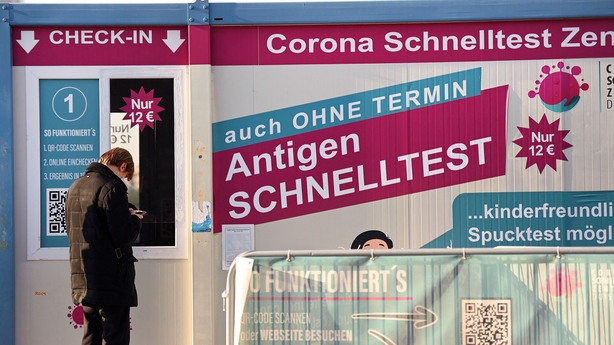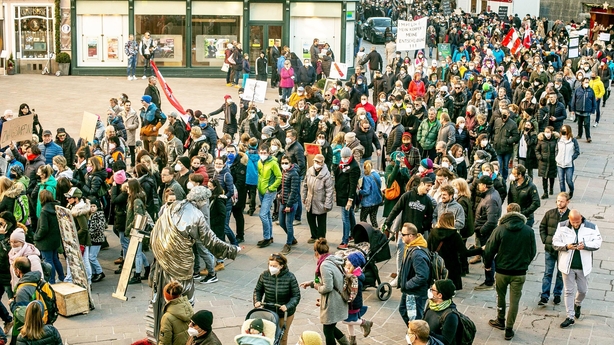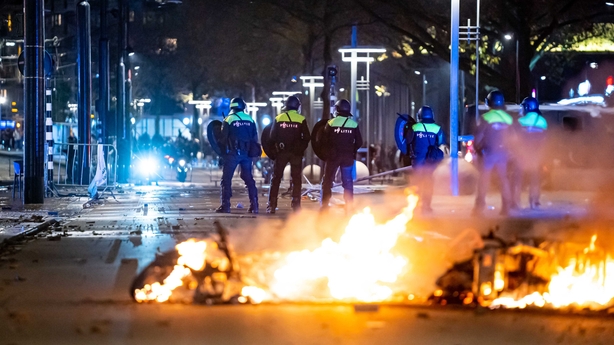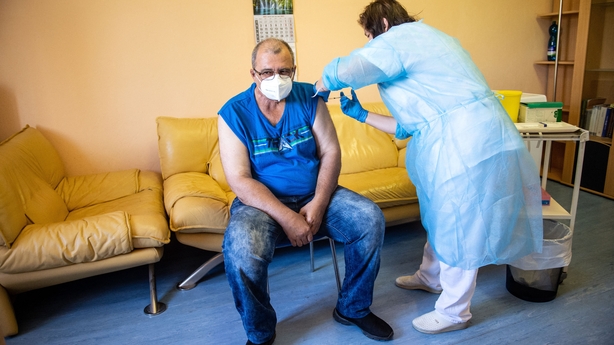Most Germans will be "vaccinated, cured or dead" from Covid-19 in a few months' time, according to the country's Health Minister.
Jens Spahn has urged more citizens to get the vaccine.
"Probably by the end of this winter, as is sometimes cynically said, pretty much everyone in Germany will be vaccinated, cured or dead," Mr Spahn said, blaming "the very contagious Delta variant".
"That is why we so urgently recommend vaccination," he added.
The stark warning comes as Germany is racing to contain a record rise in coronavirus infections in recent weeks, with hospitals sounding the alarm about overflowing intensive care units.
Despite widespread access to free vaccines, just 68% of the population is fully vaccinated, a level experts say is too low to keep the pandemic under control.
Germany, the EU's most populous country, added another 30,643 cases today, according to the Robert Koch Institute health agency, bringing the total since the start of the pandemic to just over 5.3 million.
Almost 100,000 people have died, including 62 over the past 24 hours.
"We have a very, very difficult situation in many hospitals," Mr Spahn said.

Germany last week announced tougher coronavirus curbs to contain the ferocious fourth Covid-19 wave.
In regions with high hospitalisation rates, the unvaccinated will be barred from public spaces like cinemas, gyms and indoor dining.
Employees are asked to return to working from home whenever possible, while anyone going into the workplace has to prove they are vaccinated, recovered or have recently tested negative.
The same rule applies on public transport in those areas.
Several of Germany's hardest hit regions, including Bavaria and Saxony, have gone even further by cancelling large events such as Christmas markets and effectively barring the unvaccinated from non-essential public life.
All vaccinated adults have also been urged to get a booster shot to combat waning vaccine efficacy after six months.
The US Centers for Disease Control and Prevention (CDC) has advised against travel to Germany and Denmark because of a rising number of Covid-19 cases in those countries.
The CDC raised its travel recommendation to "Level Four: Very High" for the two European countries, telling Americans they should avoid travel there.
Separately, French Prime Minister Jean Castex tested positive for Covid-19 this evening, his office told AFP, adding that he would isolate for 10 days while continuing to work.
Austria back in Covid-19 lockdown as Europe battles surge
Austria has shut shops, restaurants and festive markets ahead of the Christmas holidays and returned to lockdown in the biggest Covid-19 restriction seen in Western Europe for months.
The decision has prompted a fierce backlash, with tens of thousands taking to the streets, some blaming the government for not doing more to avert the latest wave of the virus.
As of today, Austria's 8.9 million people will not be allowed to leave home except to go to work, shop for essentials and exercise.
The Alpine nation is also imposing a sweeping vaccine mandate from 1 February - joining the Vatican as the only places in Europe with such a requirement.
Battling a resurgent pandemic almost two years since Covid-19 first emerged, several countries on the continent have reintroduced curbs, often choosing to ban unvaccinated people from venues like restaurants and bars.
We need your consent to load this rte-player contentWe use rte-player to manage extra content that can set cookies on your device and collect data about your activity. Please review their details and accept them to load the content.Manage Preferences
Austria's decision breaks earlier promises that tough virus restrictions would be a thing of the past.
Over the summer, then chancellor Sebastian Kurz had declared the pandemic "over".
But plateauing inoculation rates, record case numbers and a spiralling death toll have forced the government to walk back such claims.
After taking office in October, Chancellor Alexander Schallenberg criticised the "shamefully low" vaccine rate – 66% compared to France's 75% - and banned the unvaccinated from public spaces.
When that proved ineffective, he announced a nationwide lockdown of 20 days, with an evaluation after ten days.
Schools will remain open, although parents have been asked to keep their children at home if possible. Working remotely is also recommended.

Political analyst Thomas Hofer blamed Mr Schallenberg for maintaining "the fiction" of a successfully contained pandemic for too long.
"The government didn't take the warnings of a next wave seriously," he said. "The chaos is evident."
Covid riots 'pure violence' by 'idiots' - Dutch PM

Dutch Prime Minister Mark Rutte has criticised three nights of unrest over anti-Covid measures as "pure violence" by "idiots" and vowed to prosecute those responsible.
Riots have taken place in several cities around the country since Friday.
Mr Rutte called the rioting "pure violence under the guise of protest".
He added he would always defend the right to protest, but "I will never accept that idiots use pure violence," he told Dutch media.
Over 130 people have been arrested in the Netherlands over three days of unrest sparked by a Covid-19 curfew.
"People want to live," said one of the organisers of the Dutch protests, Joost Eras. "That's why we're here."
Slovakia introduces lockdown for unvaccinated
Slovakia has introduced a lockdown for people unvaccinated against Covid-19, the health ministry said, as the central European country battles one of the world's highest coronavirus infection rates.
Unvaccinated people are not allowed to enter stores other than those considered essential, such as supermarkets or pharmacies - even with a negative coronavirus test.
"We have resorted to a vigorous lockdown of the unvaccinated, because we need to protect them," Prime Minister Eduard Heger said earlier on public broadcaster RTVS.
Slovakia has the world's fourth-highest infection rate at 917 new Covid-19 cases per 100,000 inhabitants over the last seven days, according to an AFP calculation, after Slovenia, Austria and the neighbouring Czech Republic.
"The high rate is due to many factors, the most important of which is that we have very few people vaccinated, " Doctors Trade Union Association chairman Peter Visolajsky said.

"The adopted restrictions are still very weak, and they are not as effective as in the case of the previous variant of the coronavirus," he added.
He said that better enforcement of the existing restrictions and "a more intensive vaccination could reduce the number of infections".
The EU country of 5.4 million has one of the European Union's lowest vaccination rates.
Only 45.7% of the population is fully vaccinated in Slovakia.
New recommendations on travel into EU
The European Commission will this week update recommendations on international travel into the EU and come up with proposals on harmonising the duration of the validity of the EU Covid certificate.
Speaking to the European Parliament in Strasbourg, EU Health Commissioner Stella Kyriakides said disagreement between members states on the criteria for the validity of the EU Covid-19 pass needed to be avoided.
"We need to avoid fragmentation, and for this, strong coordination is key. And that is why we are currently preparing an update of the council recommendations related to free movement within the EU.
"The proposal to be adopted this week will promote and acknowledge the important role of the EU Digital Covid Certificate that travellers nowadays carry. And we will also update the recommendation on travel into the EU from around the world", she said.
Last week Greece called for a booster shot within the past six months to be introduced as a requirement for the EU Covid pass to be valid.
Italy's government is also considering a recommendation to make the pass valid up to nine months after full vaccination.
EU starts J&J Covid vaccine booster evaluation
The EU's drug watchdog has said it is evaluating an application by Johnson & Johnson for its Covid vaccine booster shot to be used on people aged 18 and over in the bloc.
If approved, the booster will be the third in the European Union for adults and will be given at least two months after a first single-shot dose.
"EMA's human medicines committee will carry out an accelerated assessment of data submitted by the company that markets the vaccine," the European Medicines Agency said, adding an outcome was "expected within weeks".
The data assessed by the Amsterdam-based EMA will include results from more than 14,000 adults who have received a second dose of the Covid-19 Vaccine Janssen or a placebo, the agency said.
Two other booster shots with vaccines made by Pfizer/Biontech and Moderna have already been approved for use in the EU.
The regulator has also currently approved four vaccines for use: Pfizer and Moderna, which use messenger RNA technology, and AstraZeneca and Johnson & Johnson, which use viral vector technology.

